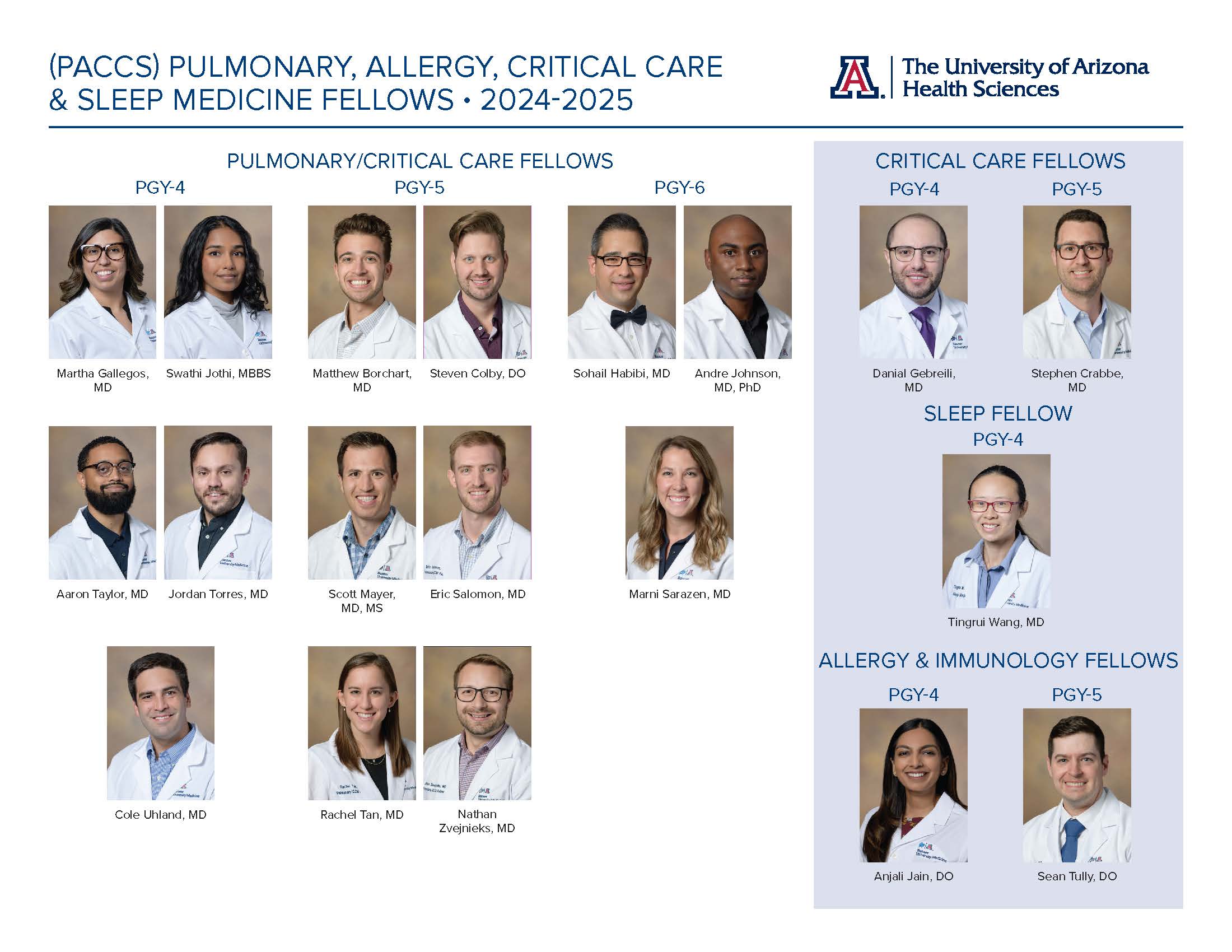Division Overview
The Division of Pulmonary, Allergy, Critical Care and Sleep Medicine was created in 1968, two years after the opening of the University of Arizona College of Medicine – Tucson.
The inaugural division chief Benjamin Burrows, MD, an emphysema and pulmonary physiology specialist, was recruited from the University of Chicago. Dr. Burrows was a visionary and left a legacy of pulmonary translational research, initially funded by the NIH Specialized Center of Research (SCOR) in Pulmonary Diseases. He launched the first “center of excellence” at the UA, the Arizona Respiratory Center, in 1971.
Our current division chief, Sairam Parthasarathy, MD, arrived in 2011. Prior to that, he was affiliated with the Southern Arizona VA Health Care System’s Tucson VA Medical Center as chief of research, section chief for pulmonary and critical care medicine, and head of the sleep medicine laboratory. He served in similar roles in Chicago before that with the Loyola University Medical Center and Edward Hines Jr. VA Hospital. Today, he also serves as medical director of the Banner – University Medical Center Tucson Center for Sleep Disorders that he established in 2012 and the founding director of the UA Health Sciences Center for Sleep and Circadian Sciences (established in 2016). With his research on sleep-disordered breathing funded by the National Institutes of Health (NIH) and Patient Centered Outcomes Research Institute (PCORI) for more than two decades, Dr. Parthasarathy also serves as a special advisor to NIH's for the 2021 Sleep Disorders Strategic Plan.
Our division now numbers more than 30 physicians and scientists. It is home to many nationally and internationally known physician-scientists pursuing breakthroughs in clinical-translational research for various pulmonary diseases and conditions. These include Ken Knox, MD, known for his research in HIV-related pulmonary diseases and clinical expertise in sarcoidosis, fungal diagnostics, immunologic lung disease and bronchoalveolar lavage and Joe G. N. “Skip” Garcia, MD, a physician-scientist on acute respiratory distress syndrome and past senior vice president, UA Health Sciences. Furthermore, our Pulmonary Services program was named among the top 50 in the nation by U.S. News & World Report in 2015-16, 2017-18 and 2018-19.
Meet Our Fellows
2024-25 fellows in allergy, critical care, pulmonary and sleep medicine (click image to enlarge):





![Collage of images to recognize National Nurses Week, including Fabulous 50 flyer for Tucson events, Dr. Abby Fuoto and the 14 nurses from Banner – University Medicine included in the Fab 50. [Collage of images to recognize National Nurses Week, including Fabulous 50 flyer for Tucson events, Dr. Abby Fuoto and the 14 nurses from Banner – University Medicine included in the Fab 50.]](https://deptmedicine.arizona.edu/sites/default/files/styles/1x_smartphone/public/2025_tucson_nurses_week_fuoto-banner_winners_card.jpg?itok=DKa20X0R×tamp=1741824695)
![Image of Dominica Padilla for Woman of Impact fundraising campaign by Southern Arizona Chapter of the American Heart Association [Image of Dominica Padilla for Woman of Impact fundraising campaign by Southern Arizona Chapter of the American Heart Association]](https://deptmedicine.arizona.edu/sites/default/files/styles/1x_smartphone/public/1-woman_of_impact_padilla_card.png?itok=rdfqsP9q×tamp=1741630651)
![Images of Department of Medicine faculty who won 2025 College of Medicine - Tucson Faculty Awards presented Feb. 27 at the HSIB Forum on the U of A Health Sciences Tucson campus. [Images of Department of Medicine faculty who won 2025 College of Medicine - Tucson Faculty Awards presented Feb. 27 at the HSIB Forum on the U of A Health Sciences Tucson campus.]](https://deptmedicine.arizona.edu/sites/default/files/styles/1x_smartphone/public/_com-t-faculty-awards_2.27.25_card.jpg?itok=0LBgB-HQ×tamp=1740891873)